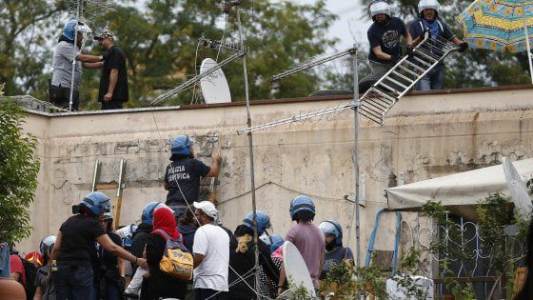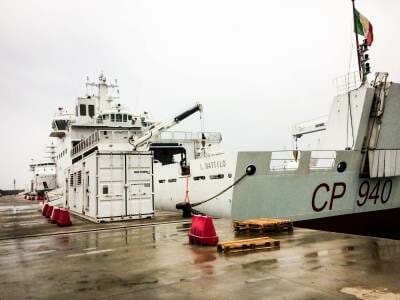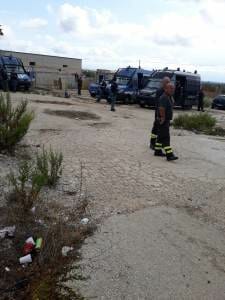Trapani 2013: the racism bus
Com.Unità Proposal from local councillor: Trapani buses for black immigrants from the
Cara (Hosting Centre for Asylum Seekers) only. But what do the immigrants
think? Frank is from the Ivory Coast, he has been in Italy for seven
months and when I ask him what he thinks of the councillor’s proposal to have a
bus only for him and the other guests of the Salinagrande Hosting Centre for
Asylum Seekers he is very direct: “It’s evil”. By his side is Mohamed
who also arrived in Italy
seven months ago from Mali.
He is waiting for the bus in Piazza Vittorio Emanuele with a friend and another
man, who is much younger and shier. They are waiting for ‘that’ bus, the one
which some people would rather they were not allowed to use: “It’s
discrimination,” he says and turns to see if the bus is coming.
It is important to be aware of the fact
that symbols are important. They help us to
concretise abstract concepts. They enable thoughts, ideologies and reflections
to be brought down to our level. Like the bus in Alabama in 1955, in which Rosa Parks insisted
on sitting in the section reserved for whites. It is therefore legitimate for
alarm bells to go off when talking about public transport and ‘race’, as it is a
symbol of a much greater story. For example, when wealthier members of society disinfect
the seats on the trains where immigrants have sat; or for the proposal which
periodically gets put forward in Trapani, in particular from the houses and
villas surrounding Salinagrande: to run a bus solely for passengers with a
different colour skin. It is an idea which is both geographically and
culturally far removed -or so one thought- from the vacuity of Italian far
right politics (not to mention Alabama).
To be precise, we are talking about the guests at the Hosting Centre for Asylum
Seekers (CARA) in Salinagrande, who take the opportunity to escape from their-
let’s say- “golden bars” and go into the city. In all of this,
however, it has not been made clear, where a black person who is not staying in
the CARA should sit. This time there is a spokesperson, local councillor Andrea
Vassallo member of the Social Reformists and elected for the first time six
months ago. In his statement, issued to the public via the Trapani Town
Council’s website, he states that as president of the transport commission he
has become spokesperson, together with the Head of the company (ATM) which runs
the bus route in that area, in order to address, “the numerous complaints
of the everyday local users of the bus route, who have spoken about the
immigrants’ antisocial behaviour.” He then goes further to clarify the
situation, “They often create and fuel situations so full of tension that
inevitably sooner or later something unpleasant will undoubtedly occur.” It
has not been made clear if the local residents are also involved in such
antisocial behaviour and creating hostilities. If this were to be the case,
would it not then be necessary to run another bus, this time for the antisocial
locals, which would leave an empty bus to go to and from Salinagrande.
Glancing over the document quickly, my eyes hit on the
shock proposal. It has been issued in the name of the commission even if some
of the members, Francesco Salone (PDL), Ninni Passalacqua (PD), Francesco
Briale (the leader of Vassallo’s party), have since tried to distance
themselves from its contents claiming they knew nothing of the publication. It
states: “It would be opportune to evaluate the hypothesis of setting up a
transport service exclusively dedicated to them. The service would be placed
under police control in order to prevent any danger to public order which could
break out.” Could it?
THE
CONTEXT
It is true that the Trapani area is under
particular pressure at the moment. There are insufficient numbers of
volunteers, interpreters, cultural mediators, psychologists and police. There
are two CIEs (Immigration Detention Centres) in Trapani (the sadly notorious
Serraino Vulpitta and Milo), in addition to another Reception Centre, Bonagia,
and finally the one in question, the Salinagrande CARA (Hosting Centre for
Asylum Seekers). Salinagrande houses asylum seekers, which we could, albeit
somewhat improperly, refer to as “the highest category of
immigrants”, with respect to the illegal immigrants who automatically
become outlaws thanks to the Bossi-Fini stupidity. The Salinagrande Cara can
take in up to 260 asylum seekers and it is staffed by a team of around 80
people, including four members of the forces of order who are responsible for
internal security. To this already crowded situation we must also add the
temporary camp of Kinisia, which opened on a disused air field at the height of
the Lybian war, when the Ghaddafi’s violent ropes of immigrant control were
intentionally slackened. On New Year’s Eve, the body of an immigrant was found
on the beach of Campobello di Mazara, while a few hours
later two boats of migrants arrived.
PETTY CRIMINALS
In effect, a recent dark episode occurred involving
the Salinagrande immigrants: last year one of the guests from the Cara was
cycling along the “via del Sale” route, which goes past the salt
flats and into the city, when he was struck by a car and died. Looking at it
from the other perspective no official police complaints have been made against
the migrants. Nonetheless, there have been cases of disorderly conduct and
drunken assault aboard the buses (whilst not reported to the police the incidents
have been highlighted in a report issued by the trade union, Uil, some time
ago). Maybe it would be possible to put an end to thefts of fruit from
trees or clothes from washing lines if there were a greater police presence in
the zone. Yet doling out punishments for such “petty crimes” to all
of those within the centre and bestowing such high criticism upon them with
segregationist methods goes against every single politics of integration. A
politics which is much needed to bring goodness to the city. Instead of
involving the centre’s guests in recreational, cultural and integration
activities in general, the idea that comes across is that the residents of the
area (and here, it us who are generalising) want them to be isolated.
This is quite the opposite of what the centre is
trying to achieve, often with the support of the local community (for example,
the scouts or the parish of Don Aldo Giordano). Kossi, an interpreter who
arrived from Togo
six years ago, explains to us, “The young political asylum seekers are our
guests and they are free to come and go as they please. We offer them food and
a place to sleep as well as some recreational activities. For example, we
organise football matches amongst the guests or against Italians. Just before
the holidays we did a tournament with the police, carabinieri and guests. I
personally give karate lessons and there are daily Italian classes, which are
very important as well as ethnic music concerts.” Kossi works at the CARA through the
“Badia Grande” cooperative. He comments on the latest news by simply
saying, “Racism will always exist”. Speaking of himself, he adds in
impeccable Italian: “I am lucky because I was able to work straight away
and I learnt your language by myself.”
THE VOICES ON THE INSIDE
Let’s go back to the marble
benches in Piazza Vittorio, on a 5 January which is almost spring-like.
“When Europeans go to Africa,” Frank
says to me, “we do not ask them to travel on separate buses!” He is
young and good-looking, Frank, maybe in another life he could have been a
model. He is also very aware of what is going on: “I reckon it is just a
political strategy. I’ve heard that there are upcoming elections in Italy, aren’t
there? Maybe it’s being done to collect votes?” When I ask him how
everything is going with the other inhabitants of Salinagrande, he smiles and
speaks of the above mentioned positive initiatives. Mohamed then reminds me
that they are both Catholics and that they attend the local church. “They
know us,” he says, “they know who we are and how we behave.” And
when I ask him how they behave on the bus, Frank replies, “It’s correct to
punish the people who don’t buy a ticket, and among those who are guilty of
that, there are also many locals. Proposing separate buses is an
exaggeration….already on board the bus we often face racist situations, for
example a white man once told me that the empty seat next to him was
taken.” Another Mohamed joins the conversation. He is a Tunisian Muslim
and asks me if I am racist. I answered that if I were I would not be here
trying to find out what they thought. Then I add a bit of philosophy,
“Throughout the world, in Sicily, in Tunisia, in the Ivory Coast, there are good people
and bad. Anyone supporting this idea of separate buses is bad and racist.”
I ask him if there are good and bad people amongst the residents of the CARA.
He lowers his head, nods and smiles, replying, “Of course there are,”
he says, “just like in the rest of the world!”
“I WAS MISUNDERSTOOD”
Meanwhile Vassallo had been contacted by the Fatto
Quotidiano to whom he stated that it had all been a great misunderstanding
and that he was, in no way whatsoever, racist. “What has been happening on
the buses is a real problem in the local community and must be dealt with, but
obviously not in the extreme way that was implied in the press release. I just
wanted to raise the awareness of the police to such cases of disorder.” It
is a shame that the original statement was written by Vassallo himself, who has
indeed promised an amended version for tomorrow.



